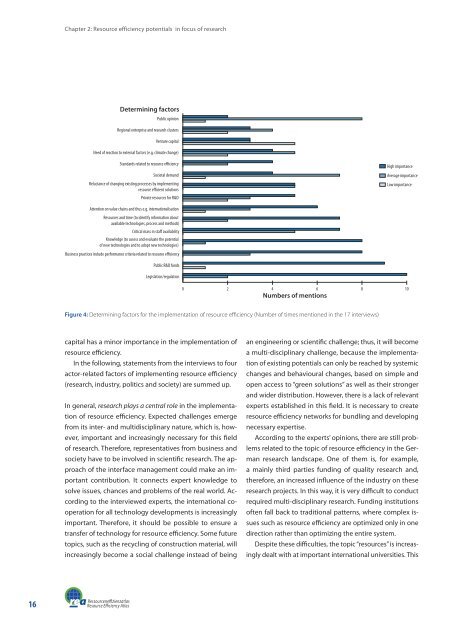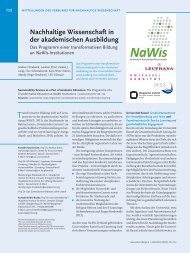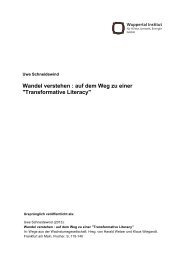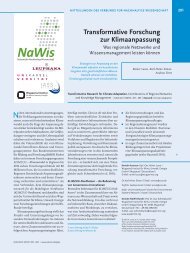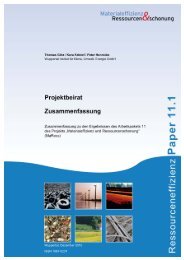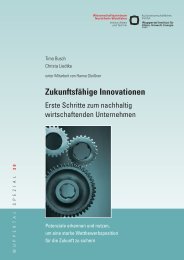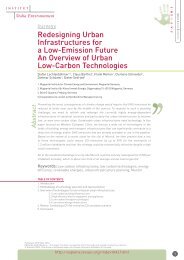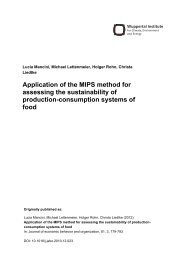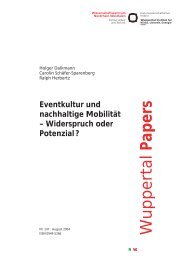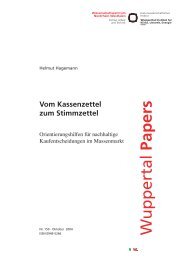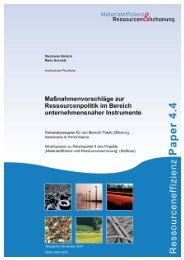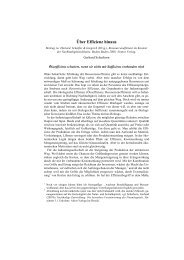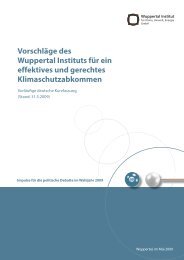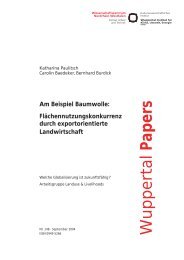Resource Efficiency Atlas - Publication Server of the Wuppertal ...
Resource Efficiency Atlas - Publication Server of the Wuppertal ...
Resource Efficiency Atlas - Publication Server of the Wuppertal ...
Create successful ePaper yourself
Turn your PDF publications into a flip-book with our unique Google optimized e-Paper software.
16<br />
Chapter 2: <strong>Resource</strong> efficiency potentials in focus <strong>of</strong> research<br />
Figure 4: Determining factors for <strong>the</strong> implementation <strong>of</strong> resource efficiency (Number <strong>of</strong> times mentioned in <strong>the</strong> 17 interviews)<br />
capital has a minor importance in <strong>the</strong> implementation <strong>of</strong><br />
resource efficiency.<br />
In <strong>the</strong> following, statements from <strong>the</strong> interviews to four<br />
actor-related factors <strong>of</strong> implementing resource efficiency<br />
(research, industry, politics and society) are summed up.<br />
In general, research plays a central role in <strong>the</strong> implementa-<br />
tion <strong>of</strong> resource efficiency. Expected challenges emerge<br />
from its inter- and multidisciplinary nature, which is, how-<br />
ever, important and increasingly necessary for this field<br />
<strong>of</strong> research. Therefore, representatives from business and<br />
society have to be involved in scientific research. The ap-<br />
proach <strong>of</strong> <strong>the</strong> interface management could make an important<br />
contribution. It connects expert knowledge to<br />
solve issues, chances and problems <strong>of</strong> <strong>the</strong> real world. According<br />
to <strong>the</strong> interviewed experts, <strong>the</strong> international cooperation<br />
for all technology developments is increasingly<br />
important. Therefore, it should be possible to ensure a<br />
transfer <strong>of</strong> technology for resource efficiency. Some future<br />
topics, such as <strong>the</strong> recycling <strong>of</strong> construction material, will<br />
increasingly become a social challenge instead <strong>of</strong> being<br />
Ressourceneffizienzatlas<br />
<strong>Resource</strong> <strong>Efficiency</strong> <strong>Atlas</strong><br />
Determining factors<br />
Public opinion<br />
Regional enterprise and research clusters<br />
Venture capital<br />
Need <strong>of</strong> reaction to external factors (e.g. climate change)<br />
Standards related to resource efficiency<br />
Societal demand<br />
Reluctance <strong>of</strong> changing existing processes by implementing<br />
resource efficient solutions<br />
Private resources for R&D<br />
Attention on value chains and thus e.g. internationalisation<br />
<strong>Resource</strong>s and time (to identify information about<br />
available technologies, process and methods)<br />
Critical mass in staff availability<br />
Knowledge (to assess and evaluate <strong>the</strong> potential<br />
<strong>of</strong> new technologies and to adopt new technologies)<br />
Business practices include performance criteria related to resource efficiency<br />
Public R&D funds<br />
Legislation/regulation<br />
High importance<br />
Average importance<br />
Low importance<br />
26 %<br />
0 2 4 6 8 10<br />
Numbers <strong>of</strong> mentions<br />
an engineering or scientific challenge; thus, it will become<br />
a multi-disciplinary challenge, because <strong>the</strong> implementation<br />
<strong>of</strong> existing potentials can only be reached by systemic<br />
changes and behavioural changes, based on simple and<br />
open access to “green solutions” as well as <strong>the</strong>ir stronger<br />
and wider distribution. However, <strong>the</strong>re is a lack <strong>of</strong> relevant<br />
experts established in this field. It is necessary to create<br />
resource efficiency networks for bundling and developing<br />
necessary expertise.<br />
According to <strong>the</strong> experts’ opinions, <strong>the</strong>re are still problems<br />
related to <strong>the</strong> topic <strong>of</strong> resource efficiency in <strong>the</strong> German<br />
research landscape. One <strong>of</strong> <strong>the</strong>m is, for example,<br />
a mainly third parties funding <strong>of</strong> quality research and,<br />
<strong>the</strong>refore, an increased influence <strong>of</strong> <strong>the</strong> industry on <strong>the</strong>se<br />
research projects. In this way, it is very difficult to conduct<br />
required multi-disciplinary research. Funding institutions<br />
<strong>of</strong>ten fall back to traditional patterns, where complex issues<br />
such as resource efficiency are optimized only in one<br />
direction ra<strong>the</strong>r than optimizing <strong>the</strong> entire system.<br />
Despite <strong>the</strong>se difficulties, <strong>the</strong> topic “resources” is increasingly<br />
dealt with at important international universities. This


